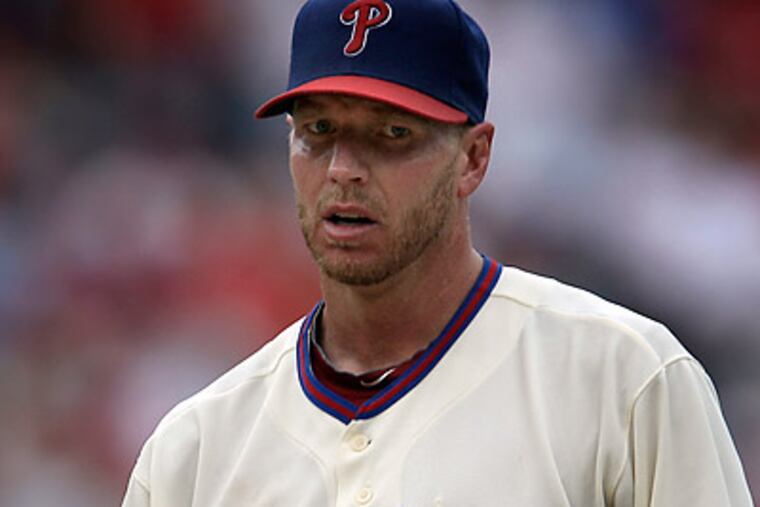Sam Donnellon: Phillies' Halladay explains subpar outing: 'That's baseball'
HE FAILED to make it through the sixth inning for the first time in 18 starts. If Roy Halladay wanted to energize an argument over pitch counts and performance, over the fine line between horse and horsebleep, he could not have done much better (or worse) than eight hits, six earned runs in the Phillies' unlikely, 8-3 loss to Boston yesterday afternoon.

HE FAILED to make it through the sixth inning for the first time in 18 starts. If Roy Halladay wanted to energize an argument over pitch counts and performance, over the fine line between horse and horsebleep, he could not have done much better (or worse) than eight hits, six earned runs in the Phillies' unlikely, 8-3 loss to Boston yesterday afternoon.
So what would he tell a local populace that has made panic a sports science?
"That's baseball," he said. "I've obviously had games where I didn't pitch well before. It's part of the game. Those things happen. And I'm pretty sure that, over the course of the rest of my career, it's going to happen again."
For the record, Halladay said his recent workload, in which he has amassed 589 pitches over his last five starts - including a 132-pitch complete game against the Pirates last Tuesday - had nothing to do with yesterday's outing.
"Bodywise," he said, "I felt great."
If you feel you've heard this before, you have. Fatigue is a tricky thing to measure among starting pitchers, or to feel, even. From spring training to whenever it ends, soreness is part of the everyday equation. Those who believe Halladay has been used or overused in the early going will underscore that he has four complete games already, half the Phillies' total for 2009. They will point out that he has faded in two of his last three starts, overlooking the wintry weather conditions of Colorado or the familiarity of yesterday's American League opponent.
Halladay now has a 14-15 record over 39 career starts against Boston. Kevin Youkilis, whose home run led off Boston's four-run sixth, has been a particular gnat in his soup, entering the day with a .352 average in 54 career at-bats before his triple and home run - which snapped a 37 1/3-inning homerless string by the Phillies' ace - boosted that.
Halladay said he left a 3-2 curveball just a little too hittable for Youkilis.
"If I had my druthers, another 6 inches down," he said.
Over and over again, he spoke of missing spots at crucial intervals, dismissing any correlation between that and fatigue.
"It's got nothing to do with anything that came before today," he said, a few minutes after Charlie Manuel had answered a similar question with a "none whatsoever."
Pitch count is one of baseball's great debates. The increased prominence of middle relievers, the emphasis on the back end, and the huge dollars spent on teenage arms that can push radar guns within a few digits of 100 have created a cuddling culture in the eyes of some, if not many. A recent Sports Illustrated story on the topic noted that in 2000, managers allowed their pitchers to throw 120 pitches or more 466 times. In 2004, that number shrunk to 186.
Last season, it was 92.
Halladay is the patron saint of those who believe too much coddling has gone on. It is at least one reason the Phillies preferred him last winter over Cliff Lee, who, unlike Halladay, had pitched on short rest only a few times before last postseason.
For the record, there was no postgame ice on the arm of the Phillies' ace when he greeted the media. Nor was there any unusual delay in his postgame interview appearance that would have suggested additional maintenance.
Manuel referred to the 14 groundball outs Halladay recorded as evidence that he is a horse who can handle the workload, and the radar gun repeatedly recorded 93 as the speed of his fastball. There was a good chance that he could have entered the sixth inning down a run rather than three had Greg Dobbs not five-holed a doubleplay groundball in the fourth inning, allowing two runs to cross.
Had Youkilis' first-inning triple landed in Shane Victorino's glove and not deflected off it, Halladay might even have entered the sixth trading zeroes with the day's unlikeliest star, Boston starter Tim Wakefield.
"He was a groundball out away from being right there," Manuel said. " . . . I'm not saying he had one of his better games. But he pitched better than how it came out."
Halladay's earned run average "ballooned" to 2.22. That's still lower than his career mark, and it's lower than it was at this time a year ago. Of course, those numbers were achieved in the American League East, where designated hitters crank and pitchers don't bat and pitch counts that just break 100 may be more taxing than a nine-inning outing against the Pirates.
"Every guy on our pitching staff is different," Manuel said. "And I think every one of them has a way of pitching and can take you into areas of the game where you have to watch them."
Said Halladay: "I think you prepare yourself all winter and all season to be able to handle the workload. That's your job as a starting pitcher. I feel like I've done that and I feel good going out there. Obviously, people are going to say what they're going to say. But from the horse's mouth, it didn't affect me. It was just a matter of making good pitches, and that's the bottom line."
Send e-mail to
For recent columns, go to